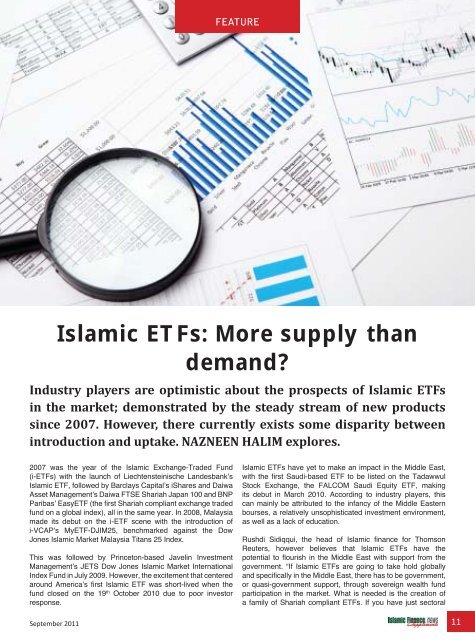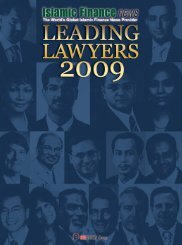Islamic Investor: Islamic Investor: - Islamic Finance News
Islamic Investor: Islamic Investor: - Islamic Finance News
Islamic Investor: Islamic Investor: - Islamic Finance News
You also want an ePaper? Increase the reach of your titles
YUMPU automatically turns print PDFs into web optimized ePapers that Google loves.
FEATURE<br />
<strong>Islamic</strong> ETFs: More supply than<br />
demand?<br />
Industry players are optimistic about the prospects of <strong>Islamic</strong> ETFs<br />
in the market; demonstrated by the steady stream of new products<br />
since 2007. However, there currently exists some disparity between<br />
introduction and uptake. NAZNEEN HALIM explores.<br />
2007 was the year of the <strong>Islamic</strong> Exchange-Traded Fund<br />
(i-ETFs) with the launch of Liechtensteinische Landesbank’s<br />
<strong>Islamic</strong> ETF, followed by Barclays Capital’s iShares and Daiwa<br />
Asset Management’s Daiwa FTSE Shariah Japan 100 and BNP<br />
Paribas’ EasyETF (the fi rst Shariah compliant exchange traded<br />
fund on a global index), all in the same year. In 2008, Malaysia<br />
made its debut on the i-ETF scene with the introduction of<br />
i-VCAP’s MyETF-DJIM25, benchmarked against the Dow<br />
Jones <strong>Islamic</strong> Market Malaysia Titans 25 Index.<br />
This was followed by Princeton-based Javelin Investment<br />
Management’s JETS Dow Jones <strong>Islamic</strong> Market International<br />
Index Fund in July 2009. However, the excitement that centered<br />
around America’s fi rst <strong>Islamic</strong> ETF was short-lived when the<br />
fund closed on the 19 th October 2010 due to poor investor<br />
response.<br />
<strong>Islamic</strong> ETFs have yet to make an impact in the Middle East,<br />
with the fi rst Saudi-based ETF to be listed on the Tadawwul<br />
Stock Exchange, the FALCOM Saudi Equity ETF, making<br />
its debut in March 2010. According to industry players, this<br />
can mainly be attributed to the infancy of the Middle Eastern<br />
bourses, a relatively unsophisticated investment environment,<br />
as well as a lack of education.<br />
Rushdi Sidiqqui, the head of <strong>Islamic</strong> fi nance for Thomson<br />
Reuters, however believes that <strong>Islamic</strong> ETFs have the<br />
potential to fl ourish in the Middle East with support from the<br />
government. “If <strong>Islamic</strong> ETFs are going to take hold globally<br />
and specifi cally in the Middle East, there has to be government,<br />
or quasi-government support, through sovereign wealth fund<br />
participation in the market. What is needed is the creation of<br />
a family of Shariah compliant ETFs. If you have just sectoral<br />
September 2011 11

















